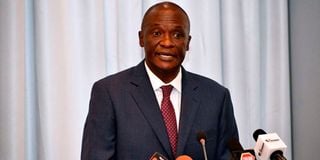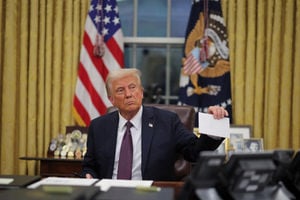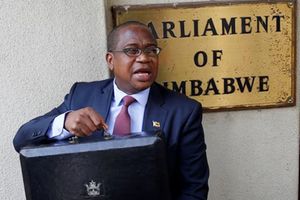Kenya explores new health partnerships as US abandons WHO

Acting Director General for Health Dr. Patrick Amoth.
Kenya is exploring various strategies to strengthen its health systems and address potential challenges following the United States' announcement to withdraw from the World Health Organisation (WHO).
Director-general of health, Dr Patrick Amoth, said Kenya aims to strengthen bilateral health partnerships by working with other nations and institutions to fill the funding and expertise gaps left by the US move to ensure that Kenya's health priorities remain intact.
"Collaboration with international partners is critical to ensure that our health priorities are not compromised," Dr Amoth told journalists at the ministry headquarters on Wednesday, January 22.
He stressed the need for Kenya to advocate for multilateral support through the African Union and other global platforms to keep Africa's health needs on the agenda.
Dr Amoth also emphasised the importance of strengthening regional health systems by working closely with neighbouring countries to improve health infrastructure, strengthen disease surveillance and enable coordinated responses to emerging health challenges.
"Strengthening regional partnerships is essential to address cross-border health challenges. We must work together as a region to protect the health of our people," he said.
The director-general also stressed the need to increase domestic financing for health by mobilising local resources to support key health programmes and reduce dependence on external funding.
"Increasing local resources for health is critical to ensure our sustainability, especially as we face global shifts in funding," he said.
Dr Amoth also mentioned the promotion of public-private partnerships (PPPs) to attract investment and the need to engage with alternative global health partners, including the European Union and the Gates Foundation.
He advocated shared global responsibility in responding to health emergencies through health diplomacy, and called for reforms within WHO to ensure equitable resource allocation.
On Monday, the United States announced its intention to withdraw from WHO, a move that marks a major shift in global health diplomacy and has far-reaching implications for public health, particularly in countries like Kenya.
Over seven decades, the US-WHO partnership has played a critical role in combating global health threats, from the eradication of smallpox to the fight against HIV/AIDS, malaria and tuberculosis.
Since the US has historically been the WHO's largest financial supporter, providing about 18 percent of its total funding, its departure leaves a gaping financial and operational void that could disrupt critical health initiatives worldwide.
According to public health experts withdrawal is likely to jeopardise programmes across the organisation, particularly those tackling tuberculosis, the world's leading infectious disease killer, as well as malaria and HIV/AIDS and other health emergencies.
US-backed initiatives such as the President's Emergency Plan for Aids Relief (Pepfar) have been crucial in Kenya's fight against HIV/AIDS, providing antiretroviral therapy (ART) to millions of people.
According to Dr Gitahi Githinji, CEO of Amref Health Africa, the withdrawal of the US Global Fund and Pepfar would be disastrous for the fight against HIV/Aids, reversing the gains made.
"We should be worried. Our governments have relied on foreign funding to make progress against HIV. Withdrawing Pepfar would take away Sh40 billion a year. Where is Kenya going to get Sh40 billion a year to tackle the HIV problem? Reproductive health is the country's first social investment and cannot be left to neighbours or friends," said Dr Githinji.
Irene Chami, director of programmes at The End Fund, acknowledges a potential risk that the decision could affect the WHO and Kenya, particularly in the fight against neglected tropical diseases (NTDs) such as schistosomiasis and onchocerciasis (river blindness).
"One of the main sources of funding for the WHO comes from its member states, of which the US contributes a relatively large amount to its coffers.
Ms Chami notes that WHO is at the forefront of spearheading the successful implementation of the 2021-2030 NTD Roadmap for the control and elimination of NTDs, in which endemic countries have committed to progress and achievement. To achieve this, she says, resources are needed to guide and support countries.
"WHO support to African countries, which bear the brunt of NTDs - an estimated 40 percent of the global burden of NTDs, affecting an estimated 600 million people - has included technical advice and support, policy guidance, and tools and resources to support treatment, measurement and evaluation. Funding constraints may limit the proper functioning of WHO country offices, affecting the invaluable support they provide to Africa to prevent, control and eliminate NTDs.
"There is therefore a potential risk that technical support, policy and operational guidance will be affected. To mitigate this, WHO may need to consider alternative sources of funding to support its initiatives locally, regionally and globally," she says.
WHO has been instrumental in disease surveillance, health workforce training and policy advice, particularly during health emergencies.
During the Covid-19 pandemic, Kenya and Africa relied heavily on WHO's coordination of vaccine distribution through the Covax initiative.
The US withdrawal raises uncertainties about future funding for such programmes, threatening Kenya's pandemic preparedness and access to life-saving treatments.
Similarly, the WHO-led Global Polio Eradication Initiative and malaria control efforts depend on US funding and expertise. With the withdrawal, these programmes face potential disruption, threatening progress against diseases that still affect vulnerable populations.
Beyond direct funding, the US withdrawal weakens WHO's ability to lead global efforts to address emerging health challenges. The ongoing pandemic treaty, which aims to establish a robust framework for global health security, could lose momentum without US participation. For Kenya and other resource-poor countries, this will undermine the collective ability to respond to future pandemics, ensure equitable access to vaccines, and strengthen health systems.
The White House order states that the administration will cease negotiations on the WHO pandemic treaty while the withdrawal is underway. US government personnel working with the WHO will be recalled and reassigned, and the administration will seek partners to take over necessary WHO activities, according to the order.
"While the withdrawal is in progress, the Secretary of State will cease negotiations on the WHO pandemic agreement and amendments to the International Health Regulations, and actions taken to implement such agreements and amendments will not be binding on the United States," the White House said.
The WHO said on Tuesday it regretted the move by its top donor country.
"For more than seven decades, WHO and the US have saved countless lives and protected Americans and all people from health threats. Together we eradicated smallpox, and together we brought polio to the brink of eradication.
"American institutions have contributed to and benefited from WHO membership. We hope the United States will reconsider, and we look forward to a constructive dialogue to maintain the US-WHO partnership for the benefit of the health and well-being of millions of people around the world," said the World Health Organisation.





